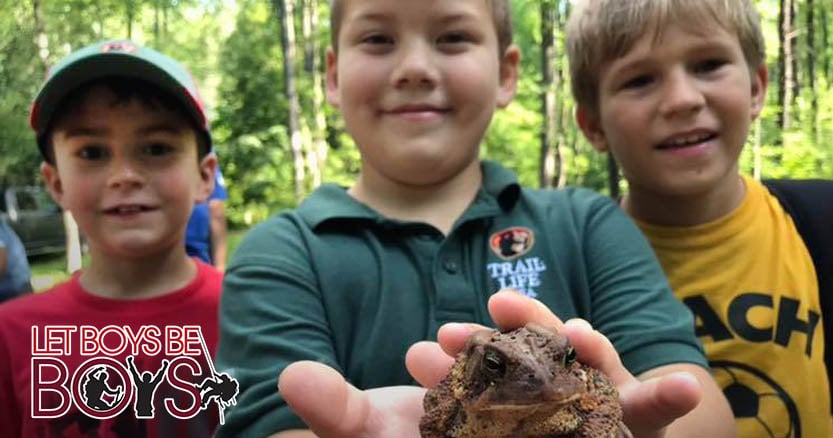A Prescription for Adventure
"Play is often talked about as if it were a relief from serious learning, but for children, play is serious learning.”
-Fred Rogers
Many parents whose boys have experienced problems focusing at school, have reported their sons function and learn remarkably well at home in an environment where they have the freedom to move, run, experiment, explore, and experience. Centuries ago Theodore Roosevelt wrote, “I believe those boys who take part in rough, hard play outside of school will not find any need for horse-play in school.”
Peter Gray, author and psychology professor emeritus at Boston College laments that, "children’s free, unscheduled playtime has been declining steadily over the past half-century, [and] ... over the same years that recess and playtime have declined, there have been rises in major depression, anxiety and the suicide rate." This break from routine may be just what the doctor ordered. If we love our children and want them to thrive, it seems they need more time and opportunity for creative play, risk, exploration, and adventure -- not less.
Modern Education
Over the past 50 years, a shift has taken place gradually in both schools and at home. Our present educational system began as a part-time institution to supplement education done at home and on the farm. A large part of the day was devoted to practical work and most learning was done at home in terms of practical application to solve a problem.
Incrementally, as greater educational needs were perceived, subjects were added and the school day grew longer. As mass education grew, so did the buildings. In the name of efficiency, practical experience was replaced by mental assent, and practical application was replaced by written assessment. Today most education is done in terms of parroting knowledge to pass an exam.
Roger Van Oech calculated that, “By the time the average person finishes college, he or she will have taken over 2,600 tests, quizzes, and exams.” This may be fine for some mathematical problems where there is in fact only one right answer. But the result of mass education with its' consistent process of inculcation, digestion, and regurgitation is the taming of the boy.
This process drives learning into desks and rows, demanding silence, and requiring a process of lecture, reading, review, assessment, and reassessment. These requirements leave little room for a boys natural curiosity - to engage his desires to discover, experiment, risk, think creatively, solve problems and innovate. The effect of this system of learning is to teach students that the best answer is in someone else’ brain.
The difficulty is that most of life isn’t this way. Life is ambiguous; and finding solutions to problems requires creativity, critical thinking, and the ability to solve problems. It requires looking past the answers of the past to a second, better right answer.
Parents and educators are understanding the problem and beginning to provide more opportunities for free-play, experiential education, and project-based (or badge-based) learning to provide opportunity to look for the second right answer -- to apply and give life to ideas -- to take risks, and to Let Boys be Boys.
A Need for Risk and Adventure
A willingness to take risks is one of the most important elements of innovation. Yet, the development of a healthy tolerance for risk is becoming one of the most endangered traits of childhood. Between an educational system that rewards rightness over risk, and a culture that emphasizes structured activity over free play – the risk muscle in many boys is atrophying.
For too many boys, opportunities for adventure, risk, and reward are disappearing. A positive desire to reduce bullying has led to a ban on rough-housing in schools altogether. A concern about self-esteem has led to the rise of participation trophies and scoreless sports leagues. A genuine concern for the safety of children has led to the disappearance of groups of children who roam neighborhood playing together, and overly structured summer and educational camps have starved boys of healthy opportunities to take risks and experience reward.
In a risk-phobic environment, boys are being driven to video games to connect with peers and experience the thrill of victory. Unfortunately, video games are scripted to keep boys winning. As a result, boys experience programmed progressive victory and learn little about the agony of defeat.
Let Boys Be Boys
For boys across the country, this extra time to learn and play at home may be just what the doctor ordered. Turn off the TV and the video games and resist the temptation to rescue your kids through over-planning. You do not owe your kids entertainment.
Leo Tolstoy wrote that, "boredom is the desire for desires." Responsibility and routine are of paramount importance, but also create a vacuum for intentional boredom. Send your boys outside to discover the feeling of running bare-chested, jumping from tree to tree, building forts, exploring, and conquering until they collapse into the tall grass and get lost in the clouds. Let them dig through bins of legos, race matchbox cars in the flower bed, ride their bikes through the neighborhood, play in a creek, and climb a tree.
Provide your sons with appropriate risk and give them the challenging hands-on learning experiences they crave. Teach them to paint, build, rake, clean, cook, and solve daily problems. Challenge them to serve the needs of the community. Engage them in tasks and responsibilities they can be successful with -- and don't micro-manage. As they engage in meaningful tasks and learn to solve problems, unleash their creativity, nurture their talents, and watch as their passions and abilities erupt.



